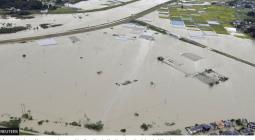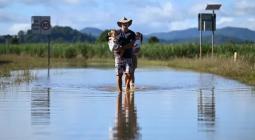Flood, drought...African farmers soon to be insured to the tune of $1bn
More than 40 million farmers in Africa could soon benefit from financing to manage the risks to their crops from climatic phenomena such as floods and drought. The African Development Bank (AfDB) recently announced the creation of the $1 billion African Climate Risk Insurance Facility for Adaptation (ACRIFA). The funds will be allocated to farmers in the form of concessional loans, high-risk capital or grants.
The year 2023 ended with good news for farmers in Africa. They should now benefit from financial support from the African Development Bank (AfDB) to help them manage the risks associated with climate shocks to their production. On 3 December 2023, the financial institution presented its plan to create the $1 billion African Climate Risk Insurance Facility for Adaptation (ACRIFA), which aims to provide insurance against the severe consequences of climate change to more than 40 million farmers across the continent.
“We need to support farmers, not abandon them, in the face of increasing frequency and intensity of extreme weather events such as drought, floods and pest infestations. At present, over 97% of farmers in Africa have no agricultural insurance. Their only insurance is prayer. When they sow, they pray for rain. When they harvest, they pray that there will be no rains or pests, and when they market their crops, they pray that prices will not collapse“, lamented Akinwumi Adesina, President of the AfDB, during the presentation of ACRIFA.
Once in place, the insurance facility portfolio will be distributed to farmers in the form of concessional financing, high-risk capital or grants. The aim is also to strengthen food security in Africa and open up commercial opportunities for the global insurance sector.
Support from the World Food Programme
In Central and West Africa, for example, the number of people without regular access to safe and nutritious food reached 48 million during the lean season from June to August 2023 (the period of the year before the first harvests, when there is a shortage of produce from previous harvests), according to a United Nations report. In addition, “ACRIFA will bring together key players to facilitate large-scale implementation, establish links between stakeholders and enable insurance to reach a greater number of the continent’s most vulnerable people”, said Beth Dunford, AfDB Vice President for Agriculture and Human and Social Development.
But before we can do that, we need to identify the farmers who are suffering from climate shocks. To support this process, the AfDB is counting on partnerships such as the World Food Programme (WFP) to provide services to clients and also to collect data. “As soon as you have data, there is transparency, and transparency creates trust. If you can bring that transparency throughout the value chain, then you’ll be able to bring trust, better investors and better support to farmers”, argued Kate Kallot, CEO of Amini AI, an artificial intelligence startup that is tackling the problem of the dearth of environmental data in Africa.
The challenge will therefore be to obtain reliable data to be able to set the correct amounts to be allocated to each farmer. In addition to stimulating investment and resilience in Africa’s agri-food systems, the African Climate Risk Insurance Facility for Adaptation, welcomed at the 28th United Nations Climate Conference (COP28) which ended in Dubai on 12 December, should also strengthen local insurers and promote integration with national and international reinsurers.
Cover photo: By Afrik21





